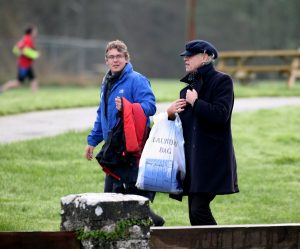Musican and activist Bob Geldof is in County Sligo today, Thursday, to film scenes for a new two-part documentary on W.B. Yeats and the Easter Rising.

Pic Shows. Bob Geldof carries his laundry bag through Lough Key Forest Park following his visit to Castle Island.
Photo Brian Farrell
The documentary series, called “WB Yeats by Bob Geldof”, will explore Yeats’ poetry in the context of the Irish War of Independence. One of his most famous poems “Easter 1916” explored the rising, ending with the iconic line “A terrible beauty is born.”
Geldof has long been a fan of Sligo’s most famous writer and has often talked about the influence it has had on his own art. The former Boomtown Rats frontman even recited several of Yeats’ poems in recordings for the British Library.
As part of the Yeats150 celebrations last year, Geldof told Discover Ireland: “I can’t imagine my life without travelling around with one of [Yeats’] books and he’s always stood me in good stead. When words fail, his words will do.”
The 64-year-old has written this new documentary series with the help of Yeats historian and scholar Roy Foster. It is a joint RTE-BBC production and will consist of two hour-long episodes.
Geldof arrived in Sligo yesterday, Wednesday, having earlier visited nearby Lough Key in Boyle, Co. Roscommon. He is expected to visit Yeats grave in Drumcliffe and a number of other sites related to the Nobel poet today.
The documentary is part of an extensive line-up of programming from RTE revolving around the centenary of the 1916 rising. Their big-budget period drama series “Rebellion” debuted on RTE One on Saturday night, January 2.
A broadcasting date for “WB Yeats by Bob Geldof” has not yet been announced by RTE.TextBut he said that the money they had got this week does not address the damage to roads caused by the floods.
“We have put in an estimate of €1.75m for work needed to repair mostly regional and local roads.”
He said that the council would be hoping that they would be receiving extra to cover this when they get their allocation of money for roads maintence at the end of this month or early February.
Mr Kilfeather said they would also be looking at submitting applications for flood prevention schemes, such as the dredging of the Owenmore river, to the OPW.
“There are certainly flooding problems arising from the Owenmore but you would probably be looking at spending half a million euro to do anything major with it. However, I don’t know how far up the national priority list schemes like that will be.”
He said the same would probably apply in other situations throughout the county where a small number of houses were affected.








